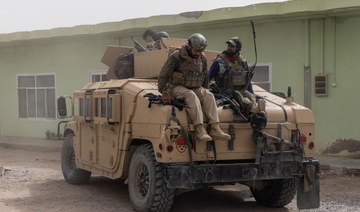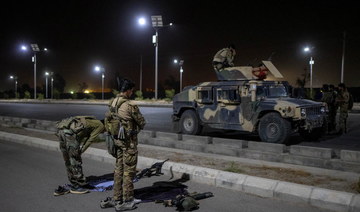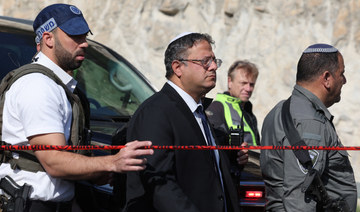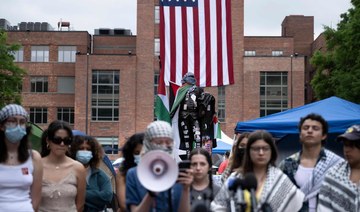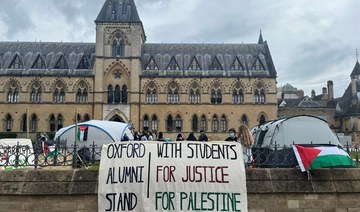KABUL: In a dimly lit basement of a posh cafe in Kabul, a group of well-dressed young men and women break out into laughter while smoking shisha pipes over a warm meal of bread and kebabs, as loud music plays in the background.
They are interrupted by a power cut, a chronic problem in the Afghan capital, before the cafe owner cranks up the generator and the music resumes.
Several said a regular meeting with friends was part of their routine but voiced concern that “the freedom and liberties they currently enjoy could be undercut” as the Taliban gain ground and US-led NATO forces leave Afghanistan after nearly 20 years of occupation.
“The Taliban’s return will mean the end of our freedom,” Shaima Rezayee, a 22-year-old university student and part of the group at the Simple Cafe, told Arab News.
Rezayee said many modern professionals were weighing in on the danger of the Taliban’s rapid advancements while she was looking to “settle elsewhere” if the group returned to power.
“When they would not let us enjoy our rights, I might have to leave this country,” she said.
Rezayee is a part of Afghanistan’s young and highly educated generation that grew up under the shield of the US military – they have travelled the world, earned master’s degrees from acclaimed universities, and are “ambitious for a better and free life in this conservative society.”
Nearly everyone at the cafe said they had heard “stories from their parents and relatives” about the Taliban’s “repressive” government and its harsh policies for women when it ruled Afghanistan for five years until it was toppled from power by Washington in late 2001.
Since then, Afghan women have regained the right to education, to vote, and to work outside their homes. Still, it is not an easy place to be a woman, where forced marriages, domestic violence and maternal mortality continue to be prevalent across the country, particularly in its rural areas.
However, access to public life has improved, especially in Kabul, where thousands of women work, while more than a quarter of Parliament is female.
But fears are mounting over the potential degradation of hard-won rights as the Taliban overrun several areas in northern and northeastern Afghanistan, which was the bastion of the anti-Taliban alliance in the late 1990s.
Last week, State Minister for Disaster Management and Humanitarian Affairs Ghulam Bhauddin Jailani said that “over 32,400 families had been forced to leave their homes in various regions because of the violence in the past one and half month.”
“We have provided some of them some aid but require assistance for a long time,” he told reporters.
According to the government’s Refugee and Repatriations Ministry, more than 5,600 Afghan families had fled to neighboring areas in the past 15 days, as the Taliban seized control of 85 percent of the territory while reassuring the international community that “citizens would be safe under their rule.”
“The Islamic Emirate is against no one and wants to treat everyone with respect,” Zabihullah Mujahid, a Taliban spokesman, told Arab News.
He added that “young Kabulis who fear a Taliban takeover have been brainwashed by propaganda,” reiterating that the rights of all Afghans, including the youth, “will be preserved under Islamic laws.”
“The young generation is our asset and (we) consider them as our future. They are talented, have earned up-to-date knowledge of the world, they will face no problem of any sort,” Mujahid said.
However, residents such as university student Mahnoosh Amiri are not convinced.
“If the situation changes (leading to the Taliban’s return), the educated people of my generation will leave,” Amiri told Arab News, adding that her father, a Russian technocrat, was more worried about her future.
“He is keen that at least me, my two sisters, and two brothers should leave now before it becomes difficult to do so,” she said, before returning to her meal at the Simple Cafe, regularly frequented by young Afghans.
The eatery is located in Kabul’s upmarket area of Karte Char, also known as Afghanistan’s “little Europe,” due to its affluent residents and surroundings.
Mina Rezayee, 32, who set up the cafe four years ago, lamented that business has been slow, partly due to the coronavirus disease (COVID-19) pandemic, rising insecurity across the country, the exit of US-led troops and speculations about the Taliban returning.
Mina, who has a degree in economics, lived as a refugee in Iran for a few years, and “despite knowing how tough it would be to migrate and leave the business behind,” she hasn’t ruled out migrating again.
“If I cannot study, work and be here in my cafe, then this place will be like a prison to me. It is not an easy decision to leave, and I have bitter memories and experiences from migration, but we will have no other option,” she told Arab News.
Long before US President Joe Biden announced the exit of foreign forces in April, tens of thousands of Afghans had fled to Europe, Australia, Turkey and the US in search of a better future, prompted by a surge in violence in Afghanistan.
Even though Washington had said for years it would withdraw its troops, Biden’s no-strings-attached announcement caught many Afghans by surprise, mainly because a peace deal between the Taliban and Kabul government had yet to be signed, despite the ongoing intra-Afghan talks in Doha, Qatar.
Afghan soldiers have surrendered en masse since the start of the drawdown of foreign troops on May 1, handing over weapons and armored vehicles to the Taliban, while the insurgents consolidate their positions near provincial capitals, including Kabul.
A recent US intelligence assessment said that Kabul could fall to the Taliban within six months after Washington exited the country.
These warnings have led to a spike in the prices of passports and visas for certain countries as more affluent Afghans rush to leave.
Fatema Saadat, 30, who runs a private cleaning company with women workers, said the Taliban’s gains “would mean Afghanistan would become like a cage for us to breathe and work.”
“To live under such circumstances would be unbearable; I will leave too.”
Young model Nigara Sadaat, who was crowned Miss Afghanistan in 2020, said that an uptick in violence had already impacted the fashion and modelling industry and that she was “personally concerned” about the future of “artists” once the Taliban take over.
Fatema and Nigara’s views are a stark contrast from the sentiments expressed by women in the deeper pockets of Afghanistan.
Often dismissed as representing “only a small and privileged subset” of Afghanistan’s population of over 36 million, a July 6 study by the Afghanistan Analysts Network found that rural women were more concerned about sustainable peace, political stability and a reduction in violence in Afghanistan.
Amid the Taliban’s rapid territorial gains in recent weeks, Haroun Rahimi, a professor at the American University in Afghanistan, said hundreds had launched the Afghan Youth Movement for Peace to voice fears over the “loss of freedom.”
“Women, in particular, are afraid they won’t be able to go to school or work. This fear manifests itself in different forms: Some feel helpless, they are in despair, they don’t want to do anything, they just want to leave the country,” he told Arab News.
Others are more optimistic.
Feraidoon Hasas, a 23-year-old manager of Turk Cafe, said his business would “possibly be shut under the Taliban’s rule,” but prayed for the restoration of peace, recalling how his father would “praise the Taliban’s ability to implement the rule of law and uproot corruption to a large extent.”








